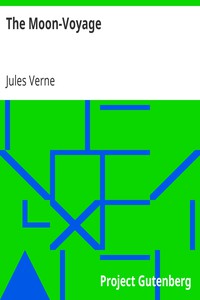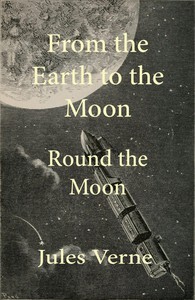The Moon-Voyage by Jules Verne (mobi ebook reader .txt) 📖

- Author: Jules Verne
Book online «The Moon-Voyage by Jules Verne (mobi ebook reader .txt) 📖». Author Jules Verne
"No matter," answered Michel; "if we ever become Selenites, we will inhabit the visible face. I like light."
"Unless," replied Nicholl, "the atmosphere should be condensed on the other side, as certain astronomers pretend."
"That is a consideration," answered Michel simply.
In the meantime breakfast was concluded, and the observers resumed their posts. They tried to see through the dark port-light by putting out all light in the projectile. But not one luminous atom penetrated the obscurity.
One inexplicable fact preoccupied Barbicane. How was it that though the projectile had been so near the moon, within a distance of twenty-five miles, it had not fallen upon her? If its speed had been enormous, he would have understood why it had not fallen. But with a relatively slight speed the resistance to lunar attraction could not be explained. Was the projectile under the influence of some strange force? Did some body maintain it in the ether? It was henceforth evident that it would not touch any point upon the moon. Where was it going? Was it going farther away from or nearer to the disc? Was it carried along in the gloom across infinitude? How were they to know, how calculate in the dark? All these questions made Barbicane anxious, but he could not solve them.
In fact, the invisible orb was there, perhaps, at a distance of some leagues only, but neither his companions nor he could any longer see it. If any noise was made on its surface they could not hear it. The air, that vehicle of transmission, was wanting to convey to them the groans of that moon which the Arabian legends make "a man already half-granite, but still palpitating."
It will be agreed that it was enough to exasperate the most patient observers. It was precisely the unknown hemisphere that was hidden from their eyes. That face which a fortnight sooner or a fortnight later had been, or would be, splendidly lighted up by the solar rays, was then lost in absolute darkness. Where would the projectile be in another fortnight? Where would the hazards of attraction have taken it? Who could say?
It is generally admitted that the invisible hemisphere of the moon is, by its constitution, absolutely similar to the visible hemisphere. One-seventh of it is seen in those movements of libration Barbicane spoke of. Now upon the surface seen there were only plains and mountains, amphitheatres and craters, like those on the maps. They could there imagine the same arid and dead nature. And yet, supposing the atmosphere to have taken refuge upon that face? Suppose that with the air water had given life to these regenerated continents? Suppose that vegetation still persists there? Suppose that animals people these continents and seas? Suppose that man still lives under those conditions of habitability? How many questions there were it would have been interesting to solve! What solutions might have been drawn from the contemplation of that hemisphere! What delight it would have been to glance at that world which no human eye has seen!
The disappointment of the travellers in the midst of this darkness may be imagined. All observation of the lunar disc was prevented. The constellations alone were visible, and it must be acknowledged that no astronomers, neither Faye, Chacornac, nor the Secchi, had ever been in such favourable conditions to observe them.
In fact, nothing could equal the splendour of this starry world, bathed in limpid ether. Diamonds set in the celestial vault threw out superb flames. One look could take in the firmament from the Southern Cross to the North Star, those two constellations which will in 12,000 years, on account of the succession of equinoxes, resign their rôles of polar stars, the one to Canopus in the southern hemisphere, the other to Wega in the northern. Imagination lost itself in this sublime infinitude, amidst which the projectile was moving like a new star created by the hand of man. From natural causes these constellations shone with a soft lustre; they did not twinkle because there was no atmosphere to intervene with its strata unequally dense, and of different degrees of humidity, which causes this scintillation.
The travellers long watched the constellated firmament, upon which the vast screen of the moon made an enormous black hole. But a painful sensation at length drew them from their contemplation. This was an intense cold, which soon covered the glasses of the port-lights with a thick coating of ice. The sun no longer warmed the projectile with his rays, and it gradually lost the heat stored up in its walls. This heat was by radiation rapidly evaporated into space, and a considerable lowering of the temperature was the result. The interior humidity was changed into ice by contact with the window-panes, and prevented all observation.
Nicholl, consulting the thermometer, said that it had fallen to 17° (centigrade) below zero (1° Fahr). Therefore, notwithstanding every reason for being economical, Barbicane was obliged to seek heat as well as light from gas. The low temperature of the bullet was no longer bearable. Its occupants would have been frozen to death.
"We will not complain about the monotony of the journey," said Michel Ardan. "What variety we have had, in temperature at all events! At times we have been blinded with light, and saturated with heat like the Indians of the Pampas! Now we are plunged into profound darkness amidst boreal cold, like the Esquimaux of the pole! No, indeed! We have no right to complain, and Nature has done many things in our honour!"
"But," asked Nicholl, "what is the exterior temperature?"
"Precisely that of planetary space," answered Barbicane.
"Then," resumed Michel Ardan, "would not this be an opportunity for making that experiment we could not attempt when we were bathed in the solar rays?"
"Now or never," answered Barbicane, "for we are usefully situated in order to verify the temperature of space, and see whether the calculations of Fourier or Pouillet are correct."
"Any way it is cold enough," said Michel. "Look at the interior humidity condensing on the port-lights. If this fall continues the vapour of our respiration will fall around us in snow."
"Let us get a thermometer," said Barbicane.
It will be readily seen that an ordinary thermometer would have given no result under the circumstances in which it was going to be exposed. The mercury would have frozen in its cup, for it does not keep liquid below 44° below zero. But Barbicane had provided himself with a spirit thermometer, on the Walferdin system, which gives the minima of excessively low temperature.
Before beginning the experiment this instrument was compared with an ordinary thermometer, and Barbicane prepared to employ it.
"How shall we manage it?" asked Nicholl.
"Nothing is easier," answered Michel Ardan, who was never at a loss. "Open the port-light rapidly, throw out the instrument; it will follow the projectile with exemplary docility; a quarter of an hour after take it in."
"With your hand?" asked Barbicane.
"With my hand," answered Michel.
"Well, then, my friend, do not try it," said Barbicane, "for the hand you draw back will be only a stump, frozen and deformed by the frightful cold."
"Really?"
"You would feel the sensation of a terrible burn, like one made with a red-hot iron, for the same thing happens when heat is brutally abstracted from our body as when it is inserted. Besides, I am not sure that objects thrown out still follow us."
"Why?" said Nicholl.
"Because if we are passing through any atmosphere, however slightly dense, these objects will be delayed. Now the darkness prevents us verifying whether they still float around us. Therefore, in order not to risk our thermometer, we will tie something to it, and so easily pull it back into the interior."
Barbicane's advice was followed. Nicholl threw the instrument out of the rapidly-opened port-light, holding it by a very short cord, so that it could be rapidly drawn in. The window was only open one second, and yet that one second was enough to allow the interior of the projectile to become frightfully cold.
"Mille diables!" cried Michel Ardan, "it is cold enough here to freeze white bears!"
Barbicane let half-an-hour go by, more than sufficient time to allow the instrument to descend to the level of the temperature of space. The thermometer was then rapidly drawn in.
Barbicane calculated the quantity of mercury spilt into the little phial soldered to the lower part of the instrument, and said—
"One hundred and forty degrees centigrade below zero!" (218° Fahr.)
M. Pouillet was right, not Fourier. Such was the frightful temperature of sidereal space! Such perhaps that of the lunar continents when the orb of night loses by radiation all the heat which she absorbs during the fifteen days of sunshine.
CHAPTER XV. HYPERBOLA OR PARABOLA.Our readers will probably be astonished that Barbicane and his companions were so little occupied with the future in store for them in their metal prison, carried along in the infinitude of ether. Instead of asking themselves where they were going, they lost their time in making experiments, just as if they had been comfortably installed in their own studies.
It might be answered that men so strong-minded were above such considerations, that such little things did not make them uneasy, and that they had something else to do than to think about their future.
The truth is that they were not masters of their projectile—that they could neither stop it nor alter its direction. A seaman can direct the head of his ship as he pleases; an aëronaut can give his balloon vertical movement. They, on the contrary, had no authority over their vehicle. No manoeuvre was possible to them. Hence their not troubling themselves, or "let things go" state of mind.
Where were they at that moment, 8 a.m. during that day called upon earth the sixth of December? Certainly in the neighbourhood of the moon, and even near enough for her to appear like a vast black screen upon the firmament. As to the distance which separated them, it was impossible to estimate it. The projectile, kept up by inexplicable forces, has grazed the north pole of the satellite at less than twenty-five miles' distance. But had that distance increased or diminished since they had been in the cone of shadow? There was no landmark by which to estimate either the direction or the velocity of the projectile. Perhaps it was going rapidly away from the disc and would soon leave the pure shadow. Perhaps, on the contrary, it was approaching it, and would before long strike against some elevated peak in the invisible atmosphere, which would have terminated the journey, doubtless to the detriment of the travellers.
A discussion began upon this subject, and Michel Ardan, always rich in explanations, gave out the opinion that the bullet, restrained by lunar attraction, would end by falling on the moon like an aërolite on to the surface of the terrestrial globe.
"In the first place," answered Barbicane, "all aërolites do not fall upon the surface of the earth; only a small proportion do so. Therefore, if we are aërolites it does not necessarily follow that we shall fall upon the moon."
"Still," answered Michel, "if we get near enough—"
"Error," replied Barbicane. "Have you not seen shooting stars by thousands in the sky at certain epochs?"
"Yes."
"Well, those stars, or rather corpuscles, only shine by rubbing against the atmospheric strata. Now, if they pass through the atmosphere, they pass at less than 16 miles from our globe, and yet they rarely fall. It is the same with our projectile. It may approach very near the moon, and yet not fall upon it."
"But then," asked Michel, "I am curious to know how our vehicle would behave in space."
"I only see two hypotheses," answered Barbicane, after some minutes' reflection.
"What are they?"
"The projectile has the choice between two mathematical curves, and it will follow the one or the other according to the velocity with which it is animated, and which I cannot now estimate."
"Yes, it will either describe a parabola or an hyperbola."
"Yes," answered Barbicane, "with some speed it will describe a parabola, and with greater speed an hyperbola."
"I like those grand words!" exclaimed Michel Ardan. "I know at once what you mean. And what is your parabola, if you please?"
"My friend," answered the captain, "a parabola is a conic section arising from cutting a cone by a plane parallel to one of its sides."
"Oh!" said Michel in a satisfied tone.
"It is
 Have you ever thought about what fiction is? Probably, such a question may seem surprising: and so everything is clear. Every person throughout his life has to repeatedly create the works he needs for specific purposes - statements, autobiographies, dictations - using not gypsum or clay, not musical notes, not paints, but just a word. At the same time, almost every person will be very surprised if he is told that he thereby created a work of fiction, which is very different from visual art, music and sculpture making. However, everyone understands that a student's essay or dictation is fundamentally different from novels, short stories, news that are created by professional writers. In the works of professionals there is the most important difference - excogitation. But, oddly enough, in a school literature course, you don’t realize the full power of fiction. So using our website in your free time discover fiction for yourself.
Have you ever thought about what fiction is? Probably, such a question may seem surprising: and so everything is clear. Every person throughout his life has to repeatedly create the works he needs for specific purposes - statements, autobiographies, dictations - using not gypsum or clay, not musical notes, not paints, but just a word. At the same time, almost every person will be very surprised if he is told that he thereby created a work of fiction, which is very different from visual art, music and sculpture making. However, everyone understands that a student's essay or dictation is fundamentally different from novels, short stories, news that are created by professional writers. In the works of professionals there is the most important difference - excogitation. But, oddly enough, in a school literature course, you don’t realize the full power of fiction. So using our website in your free time discover fiction for yourself. 




Comments (0)